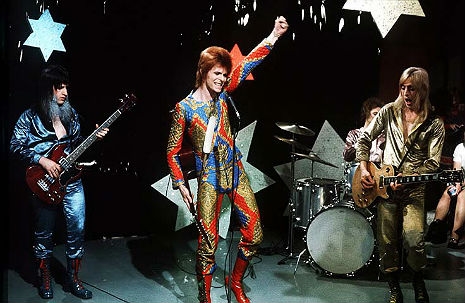
In February 1972, several months before the release of Ziggy Stardust and the Spiders of Mars, David Bowie gave an interview to a radio interviewer in the United States, whose identity is unfortunately unknown. In the interview Bowie describes the general concept of Ziggy Stardust and discusses a bunch of tracks from the Hunky Dory and Ziggy Stardust sessions that for whatever reason had been left off those albums, songs that were released in other forms later on—in some cases much later on.
Amusingly, the interviewer appears to have a very solid source on Bowie, because he asks about unreleased material he’s not really supposed to know about. Bowie is initially alarmed at the interviewer’s depth of knowledge on these songs but quickly relaxes and jovially fills in a few blanks.
Here’s Bowie explaining Ziggy Stardust:
Interviewer: Could you explain a little more in-depth about the album that’s coming out—Ziggy?
Bowie: I’ll try very hard. It’s a little difficult, but it originally started as a concept album, but it kind of got broken up, because I found other songs I wanted to put in the album which wouldn’t have fitted into the story of Ziggy, so at the moment it’s a little fractured and a little fragmented…. I’m just lighting a cigarette….
So anyway, what you have there on that album when it does finally come out, is a story which doesn’t really take place, it’s just a few little scenes from the life of a band called Ziggy Stardust and the Spiders From Mars, who could feasibly be the last band on Earth—it could be within the last five years of Earth. I’m not at all sure. Because I wrote it in such a way that I just dropped the numbers into the album in any order that they cropped up. It depends in which state you listen to it in. The times that I’ve listened to it, I’ve had a number of meanings out of the album, but I always do. Once I’ve written an album, my interpretations of the numbers in that album are totally different afterwards than the time when I wrote them and I find that I learn a lot from my own albums about me.
That chunk of the interview is the first half. The second half is dedicated to the outtakes, including his cover of Jacques Brel’s “Amsterdam,” which was released as the B-side to “Sorrow” in October 1973; the second version of the 1971 single “Holy Holy,” which ended up being the B-side to “Diamond Dogs” in 1974; and his cover of Chuck Berry’s “Around and Around,” which was released as the B-side of the single “Drive-In Saturday” in April 1973 under the title “Round and Round.”
Two songs are of particular interest to Bowie lovers. The first one is “a thing called ‘Bombers,’ which is kind of a skit on Neil Young…. It’s quite funny.” “Bombers” was recorded during the Hunky Dory sessions and was released by RCA in the United States as a promo single in November 1971—Bowie seems to regard the song as utterly unknown, so it’s safe to say that that promo didn’t get wide release (the interviewer, earlier so eager to demonstrate his wide knowledge, also says nothing about it). Eventually “Bombers” was a bonus track on the 1990 Rykodisc reissue of Hunky Dory.
The other song is, ahem, “He’s a Goldmine,” which of course is one of Bowie’s most famous B-sides, thanks in part to Todd Haynes’ 1998 movie Velvet Goldmine, under which name the song was released, as the B-side to the 1975 re-release of “Space Oddity.” Bowie seems quite tickled by the track in its state at that time, saying that “probably the lyrics are a little bit too provocative.”
“Bombers”:
1972 U.S. radio interview:
Previously on Dangerous Minds:
‘Ziggy Stardust’ 40th anniversary box set announced